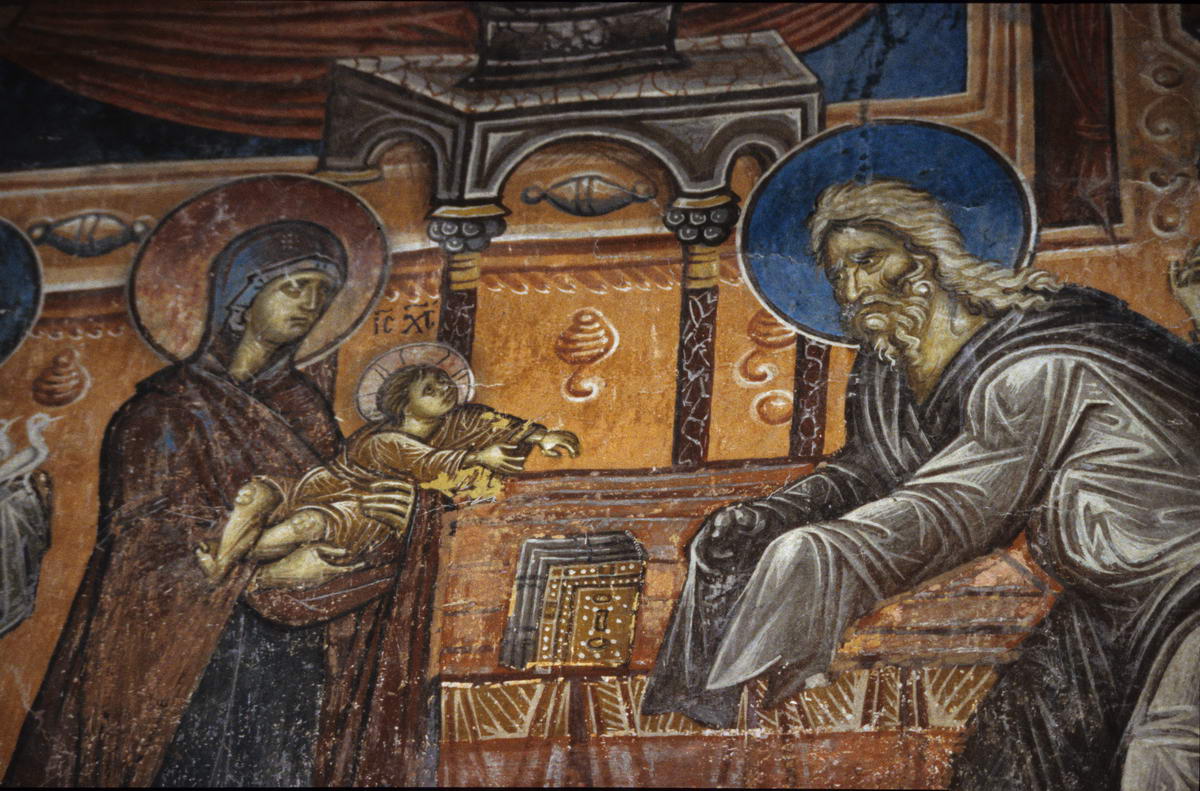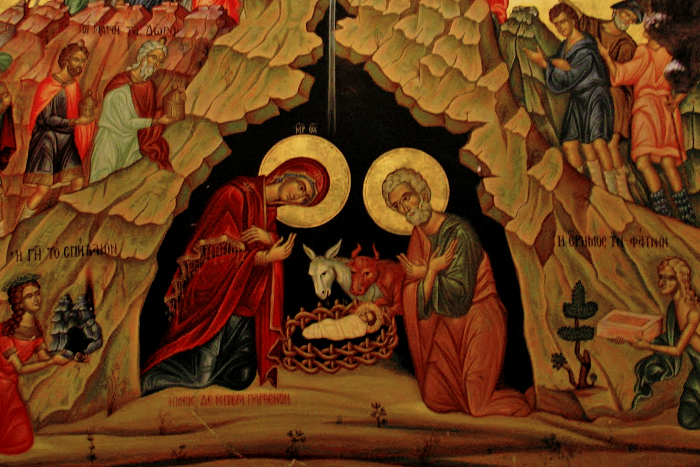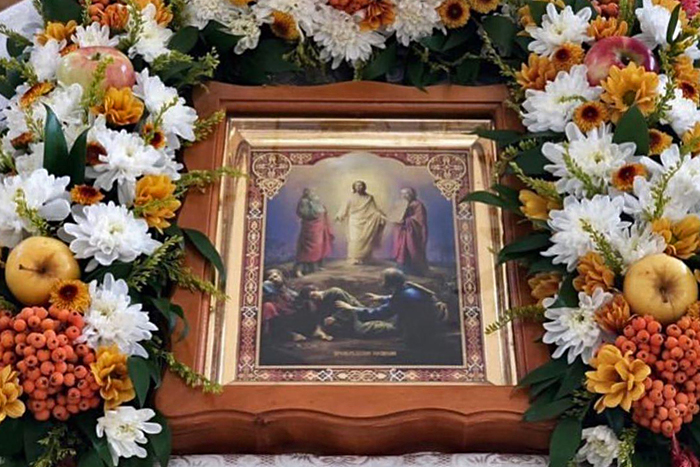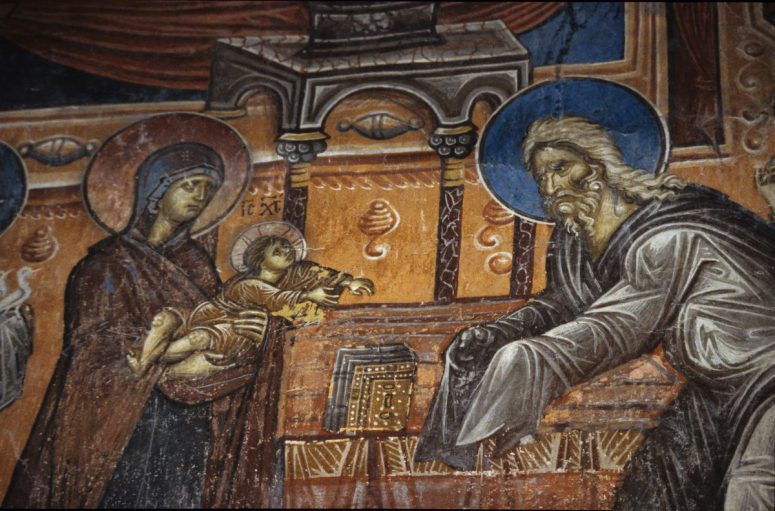
One of the most well known psalms is the 90th, beginning with, “He that dwelleth in the help of the Most High”. We read it during the sixth hour, at Pannikhidas [services for the dead], and burials. We also read it when we want to protect ourselves with divine help in complex or even dangerous situations. It is used in a similar way in the Judaic tradition. It was read at burials, during the morning prayers, and the Sabbath prayers. This also meant that this psalm was very well known to all the sons of Israel. The psalm is composed in such a way that the words in it come from the instructor, who enumerates to the one he is instructing all the various good things that proceed from hope in God. And the psalm ends with three lines now pronounced by God Himself. The last line sounds like this: “With length of days will I satisfy him, and I will show him My salvation.”
If we read the story in the gospel according to St. Luke about the events that we now call the Meeting of the Lord, we notice that the divine promise of the 90th psalm was fulfilled in the elder Simeon. This “just and devout” (Lk. 2:25) man was old and “satisfied with length of days” (cf. Ps. 90). The Holy Spirit promised him that he would not die until he had seen Christ the Lord with his own eyes.
This was the cherished desire of all the ancient righteous ones. They wanted to live as long as possible, not in order to enjoy the good things of this sorrowful world, but in order to live to see the Redeemer with their own eyes. Generation replaced generation; righteous men sadly closed their eyes and departed with faith to the darkness of death. They passed these hopes on to their posterity. And for this very reason childlessness was perceived as a curse. After all, in that case not only did you fail to live to the coming of Christ, but your seed did not take root in the earth and would never partake of that joy.
The centuries passed. Faith waned and was sullied by earthly dreams about a mighty king who would give Israel political freedom and earthly glory. Only a certain “sacred remnant”, too small in number to be noticed, lived in pure hope and patient prayer. The first among this remnant was Simeon. Before him, many righteous ones “died in faith, not having received the promises, but having seen them afar off and were persuaded of them, and embraced them” (Heb. 11:13). But all around them in those same times lived many impious and vain people, who although they lived to the coming of the Messiah did not recognize the day of their visitation due to the hardness of their souls. And this is a lesson for all. It is not enough just to live in the time of the Righteous One. It is not enough just to be near the Righteous One. None of this will be of any benefit if there is no faith, which is given by the Holy Spirit.
It is said of Simeon that, “the Holy Spirit was upon him” (Lk. 2:25). This Spirit foretold to the elder his future meeting with the Messiah. And this Spirit led Simeon to the church when the Mother of Jesus had come with her Son in her arms to perform the sacred rite. The Jerusalem Temple was never empty. This was the only sanctuary, and no other Temple could ever be created by anyone anywhere. The whole of populous Israel fulfilled their vows and brought their sacrifices to this Temple. People streamed there daily from all villages and towns, not to mention on the crowded feasts, to bring their sacrifices: guilt offerings, thanksgiving offerings, offerings according to a vow. And in the midst of this throng did Simeon, led by the Spirit, easily discern Those for Whom he had been waiting so long: the Mother and Child. He came up to the Mother, took the Infant Christ in his arms, and pronounced the prayer by which we now end every day we’ve lived and with which we hope to end our lives.
In This prayer he confessed that the promise to him had been fulfilled. “For mine eyes have seen Thy salvation, which Thou hast prepared before the face of all peoples.” Fulfilled also are the words of the 90th psalm: “I will show him My salvation.”
With his clairvoyant inner eyes Simeon saw the future Sacrifice on Golgotha. He saw the One Who now lay in his arms already crucified for the sins of the world. For the Cross with the Righteous One crucified on it is that very “salvation which God has prepared”.
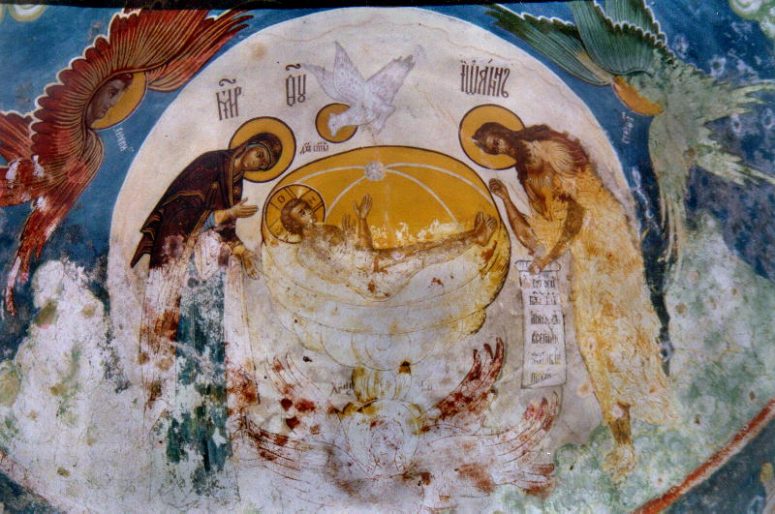
That Simeon perceived the future mystery of the Cross is clear from his words to Mary. “Yea, a sword shall pierce through thy own soul also,” he said, “that the thoughts of many hearts may be revealed.” These strange words were fulfilled when the Mother and Virgin stood before the Cross, tormented in her heart by the sufferings of her Son. Thus do eyes blinded by age acquire an eagle’s keenness in things spiritual, if the heart is purified by faith and patient expectation.
Simeon said very little, but the entire future history of the world found a reflection in his words. He foretold that Christ would enlighten the pagans; that in Israel, of whom He is the glory, He is to become a “sign which shall be spoken against”. Because of Him many will fall and many will rise. These words could hardly have been understood ahead of these events, but subsequent history justified them completely.
Having seen everything that had been so long awaited, and having said everything necessary to those who continued their earthly sojourn, Simeon departed this earth. He left it without fear or regret. He had seen the Messiah! He now went to the darkness of sheol, so that he could tell David and Solomon, Isaiah and Jeremiah that what had been promised is now fulfilled and their time to be freed is very near. Mary with Jesus in her arms remained behind him. The elder slowly and steadfastly walked to the borderline that separates this world from the other world. About these steps of his it could not have been better said:
He heard that time had lost its sound.
And the image of the Infant with radiance round
his downy crown along death’s moor
Simeon’s soul bore in the fore
like a lamp through that black dark,
in which no man had ‘er walked
with any lamp to lighten.
But his lamp shone, and the path did widen. (Joseph Brodsky, “The Meeting”)

